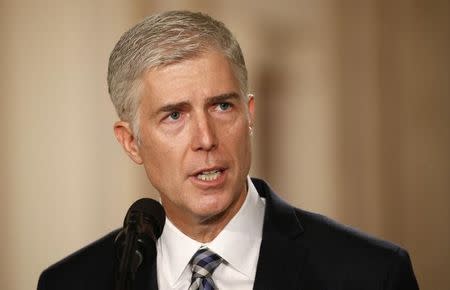Trump Supreme Court nominee Gorsuch seen in the mold of Scalia

By Andrew Chung (Reuters) - Federal appeals court judge Neil Gorsuch, the U.S. Supreme Court pick of President Donald Trump, is a conservative intellectual known for backing religious rights and seen as very much in the mold of Antonin Scalia, the justice he was chosen to replace. Gorsuch, who has not shied away from needling liberals on occasion, is 49 and could influence the high court for decades to come in the lifetime post, if confirmed by the Republican-led Senate. He is the youngest Supreme Court nominee since Republican President George H.W. Bush in 1991 picked Clarence Thomas, who was 43 at the time. He currently serves as a judge on the 10th U.S. Circuit Court of Appeals in Denver, the city where he was born. He was appointed to that post in 2006 by Republican President George W. Bush. Gorsuch, who is white, adds little diversity to the court compared with the justices appointed by Democratic President Barack Obama, both of whom were women, one becoming the first Latina justice. But he offers geographical diversity to a court dominated by justices from the east and west coasts. As an Episcopalian, he would be the only Protestant on the court, which has three Jewish justices and five Catholics. Gorsuch is seen by analysts as a jurist similar to Scalia, who died on Feb. 13, 2016. Scalia, praised by Gorsuch as "a lion of the law," was known not only for his hard-line conservatism but for interpreting the U.S. Constitution based on what he considered its original meaning, and laws as written by legislators. Like Scalia, Gorsuch is known for sharp writing skills. "It is the role of judges to apply, not alter, the work of the people’s representatives," Gorsuch said on Tuesday at the White House event announcing the nomination in remarks that echoed Scalia's views. Trump, a Republican, had the chance to nominate Gorsuch because the Republican-led U.S. Senate last year refused to consider Obama's nominee, appeals court judge Merrick Garland. Democrats, angered by the treatment of Garland, and opposing Gorsuch's conservative views, may seek to block his nomination. Trump may have favored Gorsuch for the job in hopes of a smoother confirmation process than for other potential candidates such as appeals court judge William Pryor, who has called the 1973 Supreme Court ruling legalizing abortion "the worst abomination of constitutional law in our history." FAMILIAR GROUND The federal government is familiar territory for Gorsuch, who is the son of Anne Burford, the first woman to head the U.S. Environmental Protection Agency. She served as Republican President Ronald Reagan's top environmental official but resigned in 1983, just 22 months into the job, amid a fight with Congress over documents on the EPA's use of a fund created to clean up toxic waste dumps nationwide. She was criticized by environmentalists for cutting the agency's enforcement efforts against polluters and slowing payments for cleaning up toxic waste. The high court is also familiar ground for Gorsuch, who served as a clerk for two justices including a current member of the court, Anthony Kennedy, a conservative who often casts a deciding vote in close decisions. If confirmed, he would become the first clerk to join a former boss on the Supreme Court. Gorsuch also served as a clerk for Justice Byron White, a John F. Kennedy appointee, who retired from the court in 1993. Gorsuch has strong, Ivy League academic qualifications: attending Columbia University and, like several of the other justices on the court, Harvard Law School, graduating the same year as Obama. He completed a doctorate in legal philosophy at Oxford University, spent several years in private practice and worked in George W. Bush's Justice Department. CRITIC OF LIBERALS In a 2005 article in the conservative National Review magazine, Gorsuch criticized American liberals' "overweening addiction to the courtroom" to implement a social agenda "on everything from gay marriage to assisted suicide." In his Senate confirmation hearing for his appellate court judgeship, he said the point of the article could be applied to groups across the political spectrum. In 2013, Gorsuch played a role in a high-profile ruling involving arts-and-crafts retailer Hobby Lobby, allowing owners of private companies to object on religious grounds to an Obamacare provision requiring employers to provide health insurance covering birth control for women. The decision, later upheld by the U.S. Supreme Court, said the provision violated a federal law called the Religious Freedom Restoration Act. In a concurrence, Gorsuch expressed sympathy for the choice faced by the evangelical Christian owners of the company "between exercising their faith or saving their business." Gorsuch also criticized an important legal doctrine that directs courts to defer to federal agencies' interpretation of statutes. Last August, in a case over immigration rules, Gorsuch called the doctrine the "elephant in the room" that concentrates federal power "in a way that seems more than a little difficult to square with the Constitution." He has written extensively on the topic of assisted suicide and euthanasia, arguing against legalization. In written questions related to his Senate confirmation hearings, he was asked whether his writings would make him biased in any case on the matter before him. He said his personal views would play no role in his decisions as a judge. Gorsuch is married with two teenage daughters, and lives outside of Boulder, Colorado. Friends and former clerks said he was a lover of the outdoors, describing him as an excellent skier, a fly fisherman and a runner. "We used to joke that he should be the face of Colorado tourism,” former Gorsuch clerk Jane Nitze said. (Reporting by Andrew Chung in New York; Additional reporting by Lawrence Hurley in Washington; Editing by Bill Trott and Peter Cooney)

